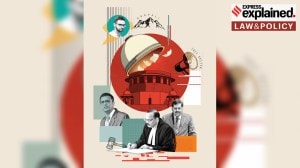There goes RBI
Wielding its rate instrument like a sledgehammer. And banks dare not object

In a bid to reduce inflation, the Reserve Bank of India has raised interest rates again. Considering the failure of such moves over the past few months in controlling prices, it is surprising that the RBI has gone for the same recipe again. The reaction of stock markets and especially of banking stocks indicates that such a sharp increase was not expected.
The hike in the repo rate, the rate at which the RBI lends to banks, and the cash reserve ratio, the proportion of deposits that banks have to hold with the RBI, to 9 per cent will continue the policy the RBI has been following for the past few months. Monetary policy has always been relatively ineffective in India; raising rates is not a good instrument for tackling inflation. While banks and households get disproportionately hit, the hike in interest rates does not lead to a general contraction of demand in the economy. First, the financial markets bond currency and derivatives markets, which in most countries act as the main institutions through which the transmission takes place are weak. Second, India has a large informal sector, and the assumed transmission of interest rates to credit squeeze to contraction in demand does not happen in the sector that is not part of formal finance. So while the RBI makes speeches about inflation, if in its actions it addresses this issue by hiking interest rates, it will, as it has in the past, have little impact. The very least one can say about the failure of this policy, which has pumped huge liquidity into the system and tried to mop it up by taxing banks and their customers through a hike in the CRR, is that because of it monetary policy inflation has gone up while growth has gone down.
Customers have been hit on both sides by higher EMIs and higher prices and are right in complaining. However, one unfortunate element of the regulatory regime in Indian banking, clear from the coverage of credit policy, is how little freedom of speech is afforded bankers. With the hike in the CRR, banks have to put additional resources in non-remunerative deposits with the RBI and this hits their profits. When in response to the policy statement bank stock prices were falling, most bankers were standing by saying that they agreed with everything that is being done. Few objected to the announcement that the RBI would set up audits and committees to control the credit growth of banks. In the licence and permit raj that rules the Indian banking system few are willing to say openly how this would affect them.
- 01
- 02
- 03
- 04
- 05































